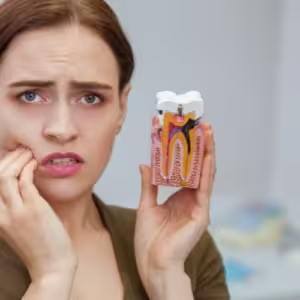
As parents, ensuring our teenagers stay healthy involves more than just physical well-being—it also means taking proactive steps to protect their dental health. Teenage years are a critical time for dental development and habits, and preventing dental emergencies is an essential aspect of maintaining overall oral health. At Dental 32 in Ashburn, VA, Dr. Ninh and our team are committed to providing comprehensive dental care and empowering parents with the knowledge to prevent dental emergencies. In this blog, we’ll explore practical tips and advice to help parents safeguard their teens’ smiles.
Understanding Common Dental Emergencies
Before diving into prevention strategies, it’s essential to understand the types of dental emergencies that teens may encounter:
Tooth Fractures and Chips: Accidents during sports, rough play, or biting hard objects can lead to tooth fractures or chips.
Knocked-Out Teeth: Trauma to the face or mouth can sometimes result in a tooth being completely knocked out (avulsed).
Dental Abscesses: Severe tooth infections can cause abscesses, leading to intense pain and swelling.
Orthodontic Emergencies: Issues related to braces or other orthodontic appliances, such as loose brackets or wires poking the gums.
Tips for Preventing Teen Dental Emergencies
1. Use Protective Gear for Sports
Encourage your teen to wear a mouthguard during sports activities. Mouthguards help cushion impacts to the face and mouth, reducing the risk of broken teeth and injuries to the soft tissues.
2. Promote Good Oral Hygiene Habits
Teach your teen the importance of brushing their teeth at least twice a day with fluoride toothpaste and flossing daily. Good oral hygiene reduces the risk of cavities and gum disease, which can lead to dental emergencies if left untreated.
3. Maintain Regular Dental Check-Ups
Schedule regular dental check-ups and cleanings at Dental 32. These visits allow Dr. Ninh to monitor your teen’s oral health, detect early signs of problems, and provide preventive care such as fluoride treatments or dental sealants.
4. Avoid Chewing Hard Objects
Discourage your teen from chewing on ice, hard candies, popcorn kernels, or other hard objects that can crack or chip teeth.
5. Address Orthodontic Issues Promptly
If your teen wears braces or other orthodontic appliances, ensure they follow Dr. Ninh’s instructions for care. This includes avoiding sticky or hard foods that can damage braces and promptly reporting any issues such as loose brackets or wires.
6. Educate About Dental Trauma
Teach your teen what to do in case of a dental emergency, such as a knocked-out tooth. Quick action can sometimes make the difference in saving a tooth. Rinse the tooth gently with water (without scrubbing), place it back into the socket if possible, or store it in milk or saliva until you can reach Dental 32 or an emergency dentist.
7. Monitor Diet and Snacking Habits
Encourage a balanced diet rich in fruits, vegetables, and calcium-rich foods like dairy products. Limit sugary snacks and beverages, as they can contribute to tooth decay.
8. Stay Aware of Dental Development
Monitor your teen’s dental development and any changes in their oral health. Be proactive in addressing concerns or abnormalities promptly to prevent potential emergencies.
What to Do in Case of a Dental Emergency
Despite best efforts, dental emergencies can still occur. Knowing how to respond can minimize damage and discomfort:
Toothache: Rinse the mouth with warm water and gently floss around the tooth to remove any trapped debris. Avoid placing aspirin or other painkillers directly on the gums.
Knocked-Out Tooth: Handle the tooth by the crown (top part), not the root. Rinse it gently with water (do not scrub), and try to place it back into the socket if possible. If not, store it in milk or saliva and seek immediate dental attention.
Broken or Chipped Tooth: Save any broken pieces and rinse the mouth with warm water. Apply a cold compress to the outside of the mouth near the affected area to reduce swelling.
Loose Braces or Wires: Use orthodontic wax to cover any protruding wires or brackets that may be causing irritation. Do not attempt to cut the wire yourself.
Conclusion
By following these preventive tips and knowing how to respond in case of a dental emergency, parents can play a crucial role in protecting their teen’s oral health. At Dental 32 in Ashburn, VA, Dr. Ninh and our team are here to support you every step of the way. Regular dental visits, good oral hygiene habits, and wearing protective gear during activities can significantly reduce the likelihood of dental emergencies. If you have any concerns about your teen’s dental health or need to schedule an appointment, don’t hesitate to contact Dental 32 today. Together, we can help your teen maintain a healthy, confident smile for years to come.
